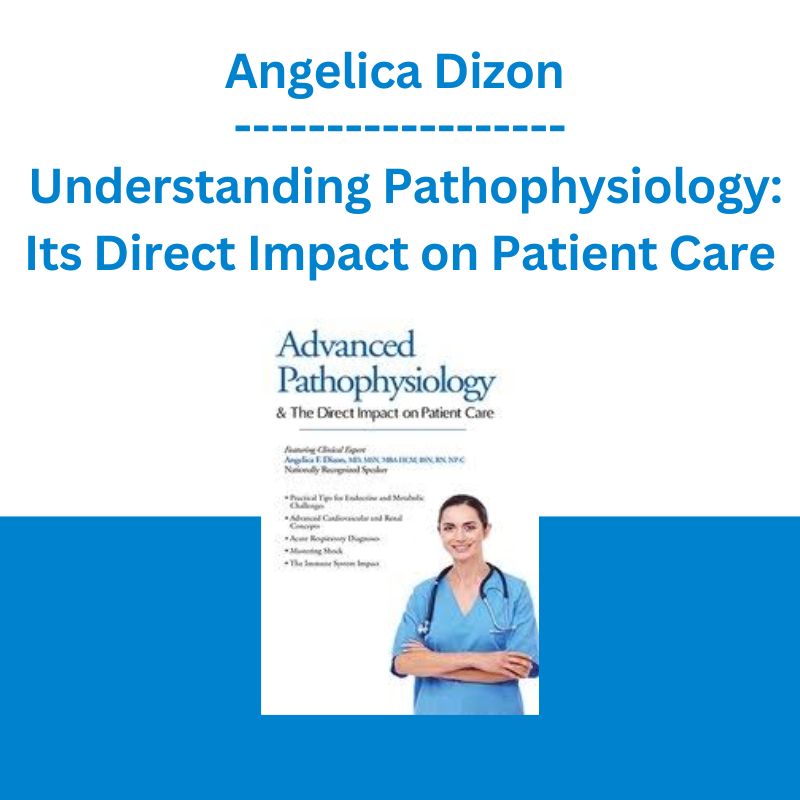*** Proof of Product ***
Exploring the Essential Features of “Angelica Dizon – Understanding Pathophysiology: Its Direct Impact on Patient Care”
As an experienced healthcare professional, you see disease and injury all the time. The underlying cause of the presenting symptoms or complications can shed critical insight in the delivery of patient care. And that is why the backbone of pathophysiology understanding is so essential. However, we know that these concepts are not always easy to master. Often patient care becomes very complex with multiple conditions and diagnoses overlapping.
Watch me! Angelica F. Dizon, MD, MSN, MBA-HCM, BSN, RN, NP-C, as I share from my extensive years in practice, working as both a physician and advance practice nurse. I will share countless practical pearls that will help you, too, to finally grasp pathophysiology at a truly advanced level.
It’s important to me that you can learn – at your own pace, your own way. For those of you who may be looking for pharmacology credits, this course also awards 3 ANCC approved pharmacology hours.
Most importantly, at the end of this comprehensive training, I guarantee that you will be able to target your clinical assessments and have confidence in the interventions that you initiate – because you will be able to dig deeper and understand so much better. All on your very next shift!
Angelica F. Dizon, MD, MSN, MBA-HCM, BSN, RN, NP-C and the PESI Healthcare Team
Speaker
Angelica Dizon, MD, MSN, MBA-HCM, BSN, RN, NP-C, is a physician, advanced care practitioner and a registered nurse, with more than two decades of experience in clinical practice. Angelica serves as the director of clinical services in one of the leading home healthcare agencies in Maryland. She has extensive past experiences both in the acute care and long-term care settings as well. Her diverse experiences provide her with unique perspectives on the importance of an in-depth understanding of pathophysiology. As a clinician, she sees complicated patient cases that require a keen understanding of overlapping disease processes. Angelica enjoys sharing her expertise and excels at putting complex topics in to a plain English approach. As such, she is a sought-after presenter, sharing her vast knowledge with experienced interdisciplinary audiences across the country.
Speaker Disclosures:
Financial: Angelica F. Dizon is a faculty member for Radians College. She receives a speaking honorarium from PESI, Inc.
Non-financial: Angelica F. Dizon has no relevant non-financial relationships to disclose.
Objectives
- Evaluate clinical examples to explain the statement: “Virtually all human disease is ‘autoimmune’ in nature.”
- Analyze an effective method to review options in pharmacologic therapy for any condition.
- Plan for the self-destructive spiral of progressive chronic heart failure.
- Determine how the statin drugs significantly reduce a person’s risk of cardiovascular disease (MI and stroke), regardless of the serum cholesterol level.
- Differentiate the mechanism underlying death in asthma and a way to prevent it.
- Apply the “Three Question Approach” to interpretation of arterial blood gases.
- Distinguish the “common mechanism” for shock, regardless of the initial cause.
Outline
Practical Tips for Endocrine and Metabolic Challenges
- Pituitary disorders
- Hypoglycemia
- Free radicals — Essential in health, deadly in disease
- Diabetic ketoacidosis
- Apoptosis
- Adrenal gland dysfunction
- Addison’s disease
- Jaundice
- Implications of hormones
- Thyroid disorders – Mechanism of onset affects treatment
Advanced Cardiovascular and Renal Concepts
- Starling’s Law – Normal capillary flow
- Heart failure
- Relationship between cardiac diseases and hypertension
- Unraveling hypertension
- Current concept on cardiogenic shock
- Atherosclerosis – The role of inflammation
- Anaphylaxis
- Acid-base disorders
Acute Respiratory Diagnoses
- Chronic obstructive pulmonary disease exacerbations
- Obstructive lung diseases affecting the mechanics of lung ventilation
- Sudden death in asthma
- Acute lung failure/ARDS
- Arterial blood gases – Made simple
Mastering Shock
- Common mechanisms of all types of shock
- The cardinal role of mediators in shock
- Newer therapies based on current pathophysiological understanding
- End points of resuscitation
- What type of shock is this?
The Immune System Impact
- Inflammation – Acute phase response
- Systemic inflammatory response
- Infection – Part of a bigger picture
- Multiple organ dysfunction syndrome
- Stress reaction
- Autoimmune diseases
Target Audience
- Nurses
- Nurse Practitioners
- Clinical Nurse Specialists
- Paramedics
- Physical Therapists
- Occupational Therapists
Please see the full list of alternative group-buy courses available here: https://lunacourse.com/shop/









